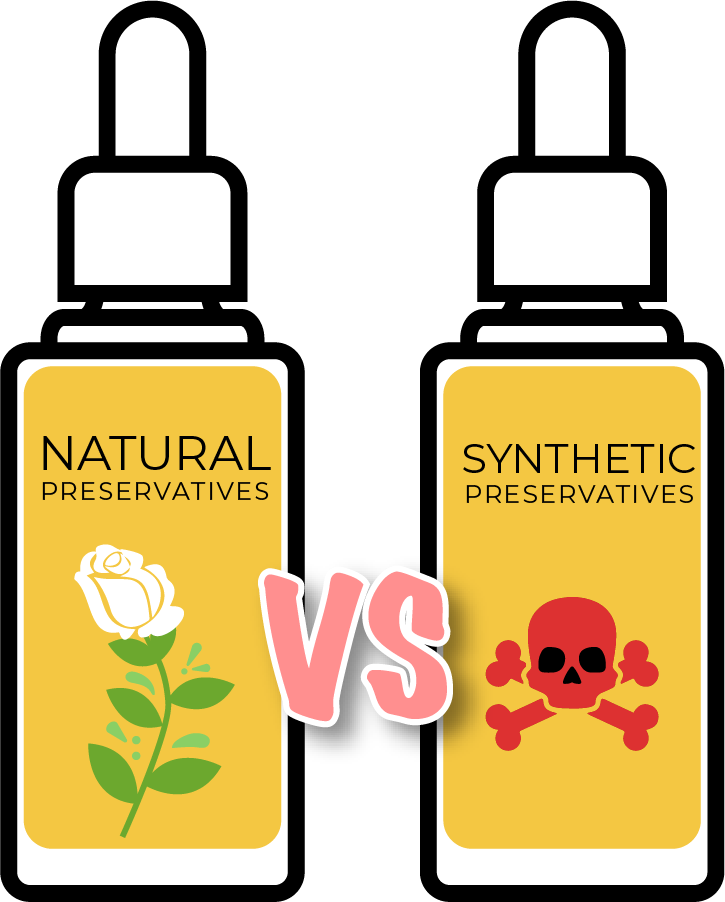Transitioning to natural preservatives that are free from harmful chemicals is a highly valuable step towards a healthier lifestyle. Preservative usage in skincare has gained a lot of media attention in the last 10 years. That’s why the internet is a very confusing place.
A simple Google search only leads to anxiety with many conflicting arguments in the realm of cosmetics, “natural skincare is ineffective”, “essential oils can cause inflammation”, “synthetic products cause sensitivity” “chemical products cause cancer”. What should we believe? And what can we do about it?
As valued consumers, we want to empower you to make informed choices for your health instead of being seduced by pretty labels and deceptive marketing. Let’s dive into some basic science on preservatives.
Whether naturally derived or synthetically produced, skincare NEEDED preservatives. The chances of finding preservative-free options are sparse, but you will still find preservative-free marketing tactics used by well-known natural brands.
To help ease the anxiety of sourcing ethical products, we are going to briefly outline popular natural and chemically derived preservatives.

Why do Skin Care formulations need preservatives?
Companies apply preservatives to prevent bacterias, yeasts and moulds (microbes). As well as stabilising and extending the shelf life of a product. Organic and Vegan Skin Care brandsoften formulate products that have a high volume of plant and fruit extracts, the ultimate skin food!
Skin Muk is one of those brands that love the concentrated phytonutrients and antioxidants found in plant oils. However, there are simple rules of nature that we have to consider when formulating. Organic materials (i.e plant oils, water and extracts) are the ultimate food for microbes! This is the very reason why most organic and natural products do contain preservatives.
Chemical vs “Natural”Preservatives
Chemical preservatives are artificial and manufactured by businesses. The protection and toxicity profiles are properly studied and they’re broad-spectrum maintaining in opposition to all microbes. That’s why companies can acquire alternatives easily and take advantage of the formulation.
Although there is no formal definition for “natural preservatives”, which we like to assume contain ingredients that are as close to nature as possible used to reduce microbial growth.
Many people are not aware but natural “preservatives” such as vitamin E, grapefruit seed and rosemary extract are NOT preservatives, they are simply antioxidants that help extend the shelf life of a product.
Unless a product is an oil or combination of oils and has no water or other ingredients added, we would recommend caution as that product is less than likely to be preservative-free.
To help ease the anxiety of sourcing ethical products. We are going to briefly outline popular natural and chemically derived preservatives.
Synthetic Preservatives

Parabens
The most controversial preservative are Parabens! they were first introduced in the 1930s and remain the most popular cosmetic and pharmaceutical preservative on the market today.
The traditional school of thought are they have a low toxicity profile and a long history of safe use. In 2004 there was a damaging study conducted which earned parabens a bad reputation when scientists found parabens in breast cancer tissue.
Other in -vitro studies and studies on mice and rats also found that parabens have estrogenic effects, whereby the chronic accumulation of “fake estrogens” can cause hormone disruption, harm reproductive organs and increase the risk of cancers. These studies suggest that it is our daily actions that lead to direct and continuous exposure. Think about the daily shampoo, moisturizer or deodorant that you have used since your teens?
Some potential benefits of paraben use are that they are inert and broad-spectrum, which simply means they are one of the least irritating on the market and have the ability to kill gram-negative and gram-positive bacteria as well as yeast and mould!
Currently, Europe banned the use of parabens and limited the use of many other chemical preservatives because there is simply not enough human clinical data available to ensure its safety.
Formaldehyde Releasers
These types of preservatives such as Diazolidinyl Urea break down and release formaldehyde which stops the growth of microbes, these types of preservatives became very popular after the paraben scandal of 2004. Although these preservatives are broad-spectrum and effective they can be very irritating to the eyes, nose and airway.
Phenoxyethanol
Synthetic preservatives are popular in natural products as it is very inert and therefore anti-irritating. The Cosmetics Regulation of the European Union approved phenoxyethanol in concentrations up to one percent.
Dehydroacetic Acid (and) Benzyl Alcohol
Permitted by Ecocert and COSMOS approved. This combination can be used together in natural and certified organic cosmetics. And used for the gentle preservation of all personal care products. This aromatic alcohol can be found naturally, however, it is mostly synthetically produced as a blend of an organic acid and alcohol that can be added at room and elevated temperatures.
Dimethylol Dimethyl Hydantoin (DMDM Hydantoin)
Commonly added to formulations in minute quantities, This is a broad-spectrum preservative blend that is found to be suitable for natural cosmetics and is permitted under some organic certifications. Some individuals may develop skin irritations while using topical products containing this chemical formulation. Consumer protection specialists are concerned by this preservative as it can release formaldehyde.
ANTIOXIDANTS IN BOTANICALS
The “Natural Preservative in Skincare”

Vitamin E (Tocopherol)
Derived from highly refined soybeans, tocopherols are natural antioxidants which “protect” the product by keeping it stable, reducing oil oxidation or discolouration which boosts the shelf life of formulations. Vitamin E is not a preservative but it can reduce the likelihood of microbial growth.

Grapefruit Seed Extract
This product is produced by extracting the antimicrobial “chemicals” (phytochemicals) from the fruit peels, pulp and seeds of the grapefruit plant and has been proven to have antimicrobial effects. Grapefruit extract is non-toxic and environmentally safe. This can be used as a preservative, antioxidant and antiseptic in cosmetics.

Glycerine (Derived From Flaxseed)
Glycerine is an ingredient that has unique properties preventing water loss from a product( used as a preservation tool by reducing the level of free water in a product). The product itself then becomes less able to support microbial growth. Glycerine is derived from organic flaxseeds and is a by-product of the soap-making process (where glycerine is separated from fatty acids in oils). Most glycerine is organic and palm oil-free.

Rosemary Extract
Rosemary extract contains Rosmarinic Acid, Carnosic Acid and Carnosol which are powerful antioxidants and are naturally occurring components of rosemary. Extract composed mostly of water such as toning mists and moisturisers often used in high oxidation risk formulation. It has also been reported to have some antimicrobial, antibacterial and antifungal properties.

Radish Root Ferment
Essentially a probiotic-based preservative, created by fermenting radish roots with the microorganism Leuconostoc Kimchii (lactic acid bacteria). Providing broad-spectrum protection, it preserves cosmetics by acidifying its environment, forming peptides which then act as a defense mechanism.
The Nature of the Industry
The cosmetic industry is rapidly growing the ingredients that are safe now can be harmful in the future.
Research and development can progress rapidly which means more scientific publications on both natural and synthetic ingredients will evolve. These studies will motivate formulators to make more ethical and evidence-based decisions in regards to preserving skincare products.
Our take-home message for consumers is simple.
Does it make you feel good to buy from an Australian Vegan Skincare brand that uses natural and organic ingredients? That also works closely and sustainably with its suppliers?
Does buying from a brand that actively researches in the hopes of avoiding potentially harmful ingredients make you happy?
How did it feel to support a brand that hurts if an animal hurts in the name of beauty?
